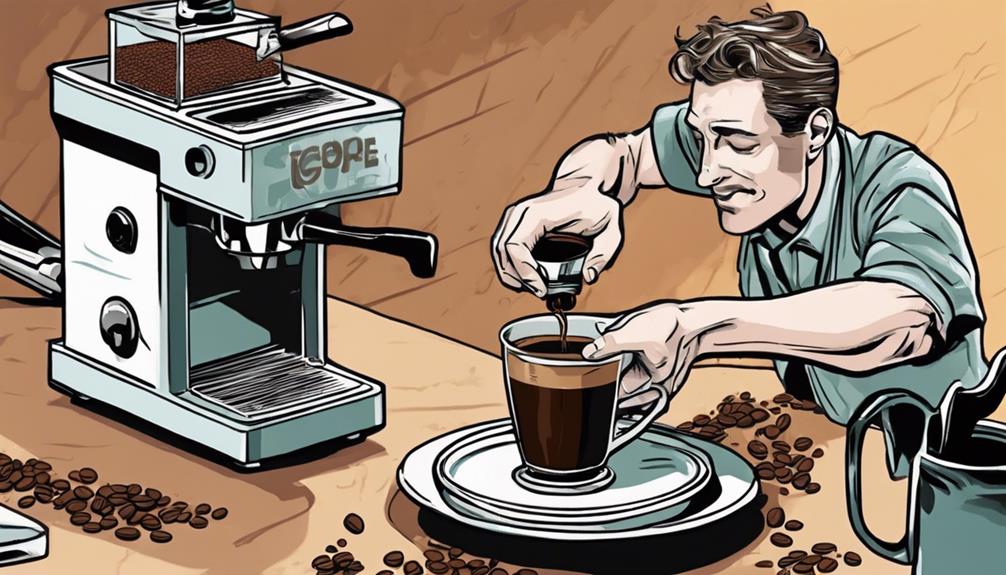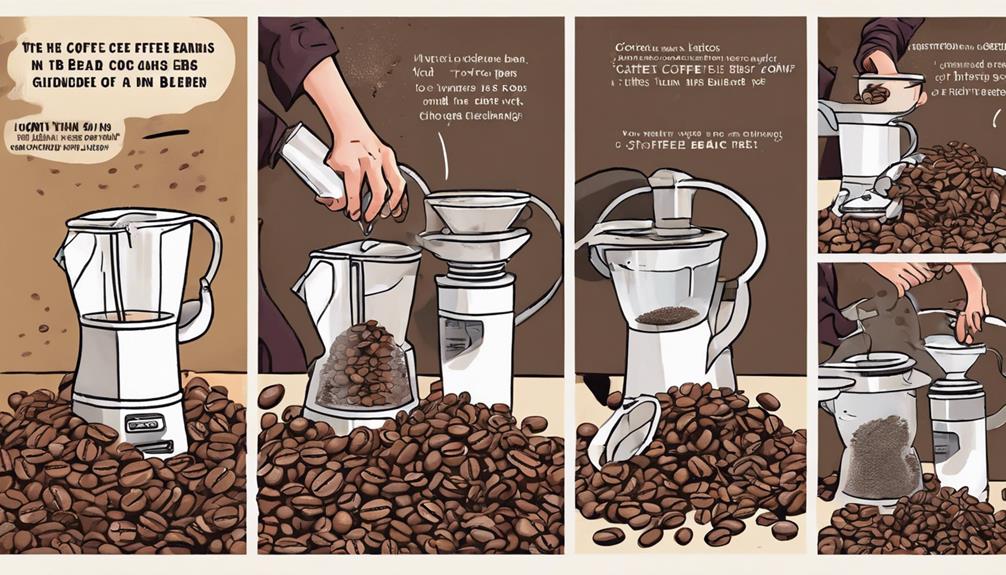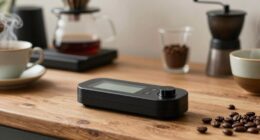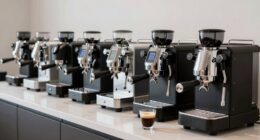When you have braces, it’s important to be mindful when drinking coffee to protect both your hardware and oral health. The acidity in coffee can weaken enamel and orthodontic adhesive, which can lead to potential damage. Staining is more obvious on clear braces, and failing to take care of your oral hygiene can increase the risks of plaque and decay. Remember to brush your teeth and braces after drinking coffee to prevent stains from setting in. Make sure to regularly clean your braces to avoid buildup of plaque. To safely enjoy your coffee, use a straw, drink in moderation, and rinse your mouth after consumption. Opting for lighter roasts can also help protect your braces. By following these tips, you can take care of your oral health while still indulging in your coffee fix.
Key Takeaways
- Use a straw to minimize teeth contact.
- Brush teeth after coffee consumption.
- Rinse mouth with water post-coffee.
- Choose lighter coffee roasts.
- Moderate coffee intake for brace protection.
Risks of Coffee on Braces
Regularly drinking coffee with braces can pose several risks to your oral health and the integrity of your orthodontic treatment. The acidity of coffee can weaken tooth enamel and the adhesive that holds your orthodontic appliances, potentially leading to damage.
This weakening effect can be particularly concerning for individuals with clear braces, as staining from coffee can impact the appearance of brackets and wires. Additionally, consuming coffee while undergoing orthodontic treatment may increase the risk of plaque buildup, decay, and gum disease if proper oral hygiene practices aren't followed.
Neglecting oral hygiene while enjoying your favorite brew can't only prolong your time in braces but also have lasting effects on your overall oral health. It's important to be mindful of how coffee can affect your braces and to prioritize good oral care habits to mitigate these risks.
Regular dental check-ups are essential to monitor the effects of coffee consumption on both your braces and oral health.
Coffee Staining and Oral Health

Coffee's composition, including tannins, chromogens, and acidity, contributes to staining tooth enamel and braces, posing risks to oral health. The staining effects of coffee are particularly noticeable on ceramic or clear braces, impacting the aesthetic appearance of your smile.
Additionally, the acidic nature of coffee can weaken enamel, the adhesive holding braces, and metal wires, potentially leading to complications with your orthodontic treatment. This acidity also increases the vulnerability to tooth decay, especially when coupled with added sugars commonly found in flavored coffee drinks.
To maintain good oral health while enjoying your coffee, it's essential to schedule regular dental check-ups. These check-ups are vital for monitoring any enamel erosion, decay, or damage to the braces caused by coffee consumption. By staying proactive and addressing any concerns promptly, you can continue to savor your coffee without compromising your oral health or the effectiveness of your metal braces.
Brushing After Coffee Consumption
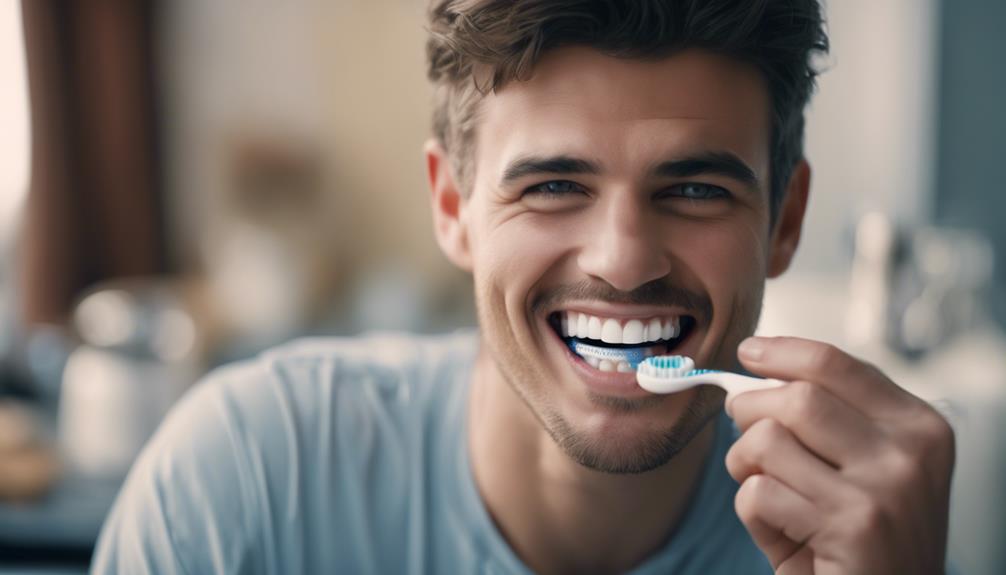
To prevent staining and maintain oral hygiene with braces, brushing your teeth after consuming coffee is essential. Coffee stains can adhere to your teeth and braces due to its pigmented nature, leading to discoloration over time.
By incorporating regular post-coffee brushing into your routine, you can reduce the risk of these stains settling on your teeth surfaces and orthodontic hardware. Immediate brushing after coffee consumption helps remove pigments that could cause discoloration and prevent residue from settling on brackets and wires.
This practice not only aids in maintaining oral hygiene but also decreases the likelihood of bad breath associated with coffee consumption. By prioritizing post-coffee brushing, you can protect your enamel from demineralization and reduce the risk of staining and erosion.
Make sure to brush thoroughly and effectively after enjoying your coffee to keep your smile clean and bright while wearing braces.
Cleaning Braces Regularly
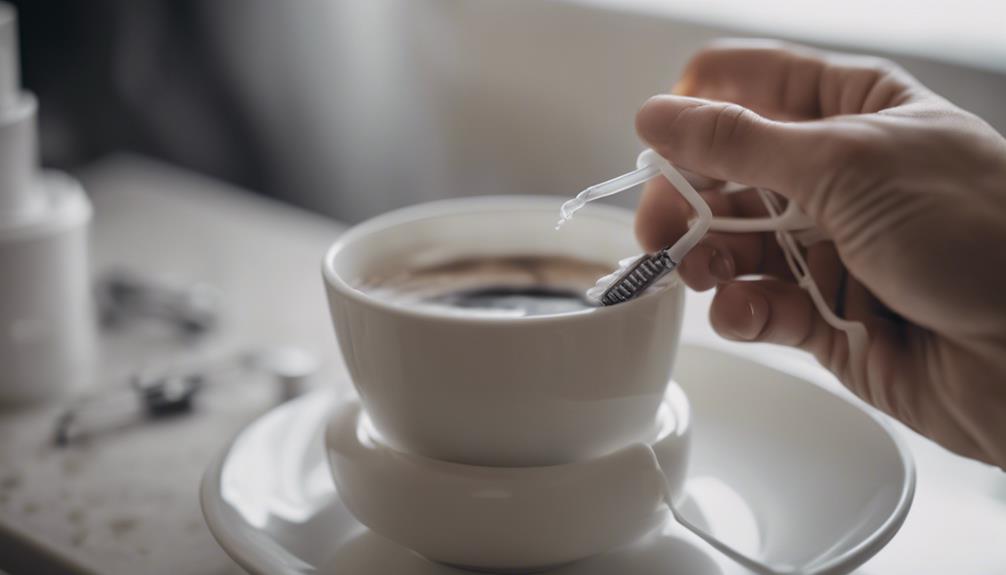
To maintain the cleanliness of your braces, remember to brush your teeth after every meal to prevent food particles from getting stuck.
Incorporate flossing into your daily routine using interdental brushes or floss threaders to clean between wires and brackets effectively.
Utilizing orthodontic tools recommended by your orthodontist will help you keep your braces in excellent condition and guarantee good oral hygiene.
Brush After Meals
Maintaining diligent oral hygiene by brushing after meals is vital for keeping your braces clean and preventing staining and plaque buildup. Brushing after meals, especially after consuming coffee, helps reduce the risk of enamel erosion and decay.
Proper oral hygiene is essential during orthodontic treatment to prevent plaque buildup and bacterial growth around the brackets and wires of your braces. By removing food particles and coffee residue through regular cleaning, you can minimize the chances of bacterial growth that could harm your teeth and gums.
Consistent brushing after meals, including after enjoying a cup of coffee, supports overall oral health and contributes to healthier teeth and gums while wearing braces. Remember, a thorough cleaning routine not only helps maintain the appearance of your braces but also promotes the longevity of your orthodontic treatment.
Prioritizing brushing after meals is a simple yet effective way to care for your braces and ensure a healthy smile.
Floss Daily
Regular flossing with braces is essential for removing food particles and plaque trapped around your orthodontic appliances. Flossing daily using the proper flossing technique is vital to prevent gum disease, decay, and staining around brackets and wires. By engaging in regular flossing with braces, you greatly reduce the risk of encountering oral health issues during your orthodontic treatment.
Incorporating tools like floss threaders or interdental brushes can facilitate flossing around braces effectively, ensuring that you reach all areas that may be challenging to access with traditional floss. Consistent flossing plays a key role in promoting good oral hygiene and maintaining the health of your teeth and gums while you have braces.
Make it a habit to floss daily to keep your braces clean and your oral health in check. Remember, proper flossing can make a significant difference in the cleanliness and health of your teeth and gums during your orthodontic treatment.
Use Orthodontic Tools
Start incorporating orthodontic tools like interdental brushes and floss threaders into your daily routine to guarantee proper cleaning of your braces and prevent plaque buildup. These specialized tools are designed to reach the challenging areas around brackets and wires where food particles can easily get trapped.
By using interdental brushes and floss threaders regularly, you can ensure better oral hygiene and greatly reduce the risk of decay and gum disease associated with braces. Orthodontists highly recommend incorporating these tools into your daily oral care regimen to achieve best results in maintaining your braces.
Proper cleaning with orthodontic tools not only enhances your oral health but also contributes to a smoother and quicker orthodontic treatment process. Remember, taking the time to clean your braces with these tools is an important step in preventing plaque buildup and maintaining overall dental health while undergoing orthodontic treatment.
Safely Enjoying Coffee With Braces

In order to safely enjoy coffee with braces, one must be mindful of potential staining and damage to your orthodontic appliances. Coffee contains tannins and chromogens that can discolor tooth enamel and braces. The acidity in coffee can also weaken tooth enamel and impact the adhesive that holds braces in place. To protect your braces and maintain oral hygiene, it is essential to brush and floss after consuming coffee.
Using a straw to drink coffee can help minimize direct contact with your teeth, reducing the risk of staining. Additionally, moderating your coffee intake, rinsing your mouth with water after drinking, and choosing lighter coffee roasts can further safeguard your braces from damage. Below is a table summarizing key tips for enjoying coffee safely with braces:
| Tips for Enjoying Coffee Safely With Braces |
|---|
| Use a straw to drink coffee |
| Brush and floss after consuming coffee |
| Moderate coffee consumption |
| Rinse mouth with water after drinking |
Impact of Coffee Brewing Methods

Various brewing methods greatly impact the acidity levels and staining potential of coffee. Cold brew coffee, for example, tends to be less acidic than other brewing methods, making it a better choice for those with braces as it reduces the risk of enamel erosion.
On the other hand, French press coffee may contain higher levels of cafestol, a compound that could potentially raise cholesterol levels.
If you enjoy drip coffee, be mindful that its acidity can vary based on factors like the quality of the beans and the brewing time.
Additionally, espresso, while concentrated, contains less liquid volume compared to other brewing methods, which can affect its overall impact on your braces.
Understanding these differences in coffee brewing methods can help you make informed choices to protect your braces from potential harm while still enjoying your favorite cup of joe.
Protecting Braces From Stains
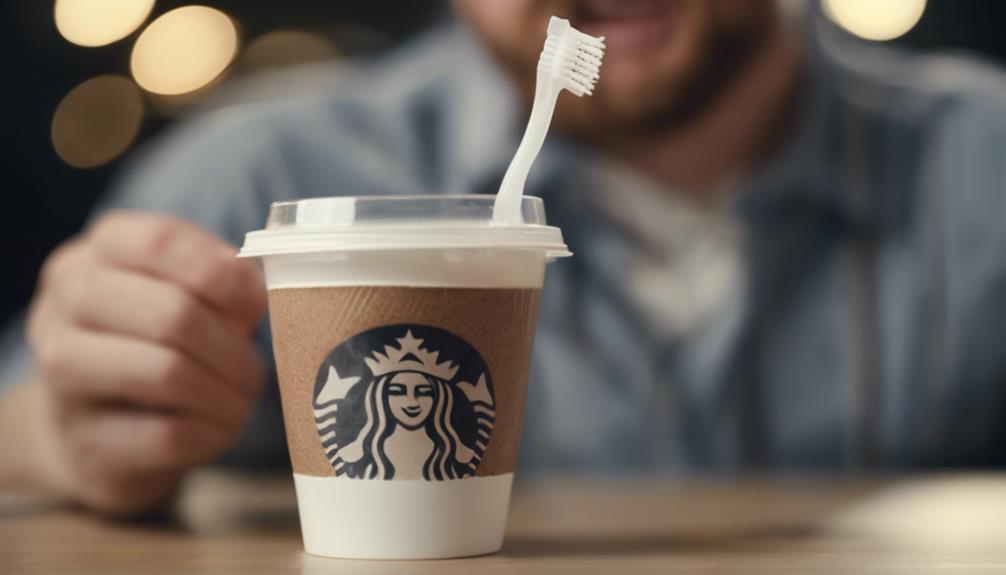
To safeguard your braces from coffee stains, it's crucial to take preventive measures. Make sure you clean your braces properly after consuming coffee.
Using a straw for sipping can help minimize direct contact between coffee and your braces, reducing the chances of staining.
Preventing Coffee Stains
Keep your braces free from coffee stains by implementing simple preventive measures. Coffee stains can easily adhere to the brackets and wires of your braces, causing noticeable discoloration. To prevent this, consider brushing your teeth immediately after enjoying your coffee. This simple step can help prevent stains from setting on your braces and teeth.
Another effective way to minimize coffee stains on your braces is to use a straw when drinking coffee. By using a straw, you can reduce direct contact between the coffee and your teeth, lowering the risk of staining.
Additionally, avoiding sugary additives in your coffee can help prevent additional plaque buildup and staining on your braces.
Cleaning Braces Properly
Maintain the cleanliness of your braces by diligently brushing after each coffee consumption to prevent staining. Coffee residue can easily cling to the brackets and wires of your braces, leading to unsightly discoloration if not taken care of promptly.
Use a fluoride toothpaste and brush gently but thoroughly to make certain all surfaces of your braces are clean. In addition to brushing, consider incorporating a water flosser or interdental brushes into your oral care routine to reach areas that are challenging to access with a regular toothbrush. These tools can help dislodge any trapped coffee particles and reduce plaque buildup around your braces.
After enjoying your coffee, rinse your mouth with water to help wash away any remaining residue and decrease the acidity levels in your mouth, which can contribute to staining. By maintaining a consistent cleaning regimen and being mindful of your coffee choices, you can protect your braces from stains and keep your smile bright throughout your orthodontic treatment.
Using Straw for Sipping
After diligently cleaning your braces to prevent staining, consider using a straw when sipping coffee to further protect your orthodontic appliances.
Using a straw for sipping can be a simple yet effective way to shield the brackets and wires of your braces from the coffee pigments that may lead to discoloration. By opting for a straw, you can minimize direct contact between the coffee and your teeth, reducing the risk of staining.
Additionally, sipping coffee through a straw can help in preventing coffee residue from accumulating around your braces, thereby aiding in your oral hygiene maintenance routine.
Enjoying your coffee through a straw not only allows you to savor your favorite beverage but also assists in decreasing the likelihood of stains on both your teeth and braces. By incorporating this small adjustment into your routine, you can help preserve the appearance and integrity of your orthodontic appliances.
Alternatives to Coffee

Explore caffeine-free alternatives to coffee that are invigorating on your teeth and braces, such as herbal teas, milk-based drinks, and fruit smoothies.
Herbal teas offer a soothing and flavorful option without the caffeine found in coffee, reducing the risk of staining your teeth.
Additionally, milk-based drinks like lattes provide a creamy and braces-friendly alternative to coffee, minimizing potential damage to your braces.
Fruit smoothies aren't only revitalizing but also gentle on your teeth, offering a fruity burst of flavor without the staining effects of coffee.
Hydrating with plain or infused water can help wash away any acidity from coffee, promoting good oral hygiene while wearing braces.
By exploring these alternatives to coffee, you can enjoy a variety of flavors while maintaining the health of your teeth and braces.
Drinking Coffee With Clear Aligners

When drinking coffee with clear aligners, make sure to brush your teeth after consuming to prevent stains and residue transfer.
Be sure to clean your aligners regularly to maintain their transparency and hygiene.
Timing your coffee consumption to align with aligner removal can help you enjoy your favorite beverage without compromising your orthodontic treatment.
Coffee Stain Prevention
To prevent coffee stains while enjoying your favorite beverage with clear aligners, consider removing them before drinking. Here are some tips to help you minimize the risk of staining your clear aligners and maintain good oral hygiene:
- Remove Aligners: Before savoring your coffee, take out your clear aligners to prevent them from getting stained.
- Brush After Drinking: After enjoying your coffee, make sure to brush your teeth to remove any residue that could lead to staining.
- Combat Bad Breath: Coffee residues mixed with saliva can contribute to bad breath; combat this by practicing good oral hygiene.
- Enjoy Convenient Cleaning: Clear aligners offer the flexibility to be easily cleaned, allowing you to maintain good oral hygiene while still enjoying your coffee.
Aligner Cleaning Tips
To uphold the cleanliness of your clear aligners while savoring your coffee, make sure to clean them regularly with mild soap or specific cleaners.
Proper orthodontic care is essential to prevent staining and bacterial growth on your aligners.
When enjoying your coffee, it's best to remove your clear aligners to avoid trapping acidic beverages against your teeth, which can lead to discoloration and decay.
After indulging in your favorite brew, remember to brush your teeth before putting your aligners back in place to prevent any residue transfer.
Clear aligners offer flexibility in dietary choices, making it convenient to remove them before consuming coffee.
By maintaining good oral hygiene practices and giving your aligners the necessary attention, you can continue to enjoy your coffee without compromising the effectiveness of your orthodontic treatment.
Take care of your aligners, and they'll take care of your smile.
Timing Coffee Consumption
Enjoying coffee with clear aligners requires careful planning to prevent potential damage and maintain their effectiveness in your orthodontic treatment. To guarantee you can still enjoy your daily dose of coffee without compromising your treatment, follow these tips:
- Remove Aligners: Before sipping your coffee, take out your clear aligners to prevent staining and warping.
- Brush After: After enjoying your coffee, brush your teeth before putting your aligners back on to minimize residue transfer and maintain oral hygiene.
- Minimize Enamel Damage: Consuming coffee with aligners on can lead to enamel damage due to its acidity, so it's best to limit the contact time.
- Timing is Key: Consider timing your coffee consumption strategically to allow for aligner removal, teeth brushing, and aligner reinsertion to protect both your aligners and your oral health.
Prioritizing Oral Hygiene

Maintain excellent oral hygiene by prioritizing regular brushing and flossing when drinking coffee with braces. Brushing your teeth after consuming coffee is essential to prevent staining and enamel erosion.
Flossing regularly is also vital to remove any trapped particles and maintain good oral hygiene.
When drinking coffee, consider using a straw to minimize direct contact with your teeth and reduce the risk of staining.
After enjoying your coffee, rinse your mouth with water to help remove coffee residue and counteract its acidity.
Additionally, make sure to schedule regular dental check-ups to monitor your oral health while indulging in coffee with braces.
Frequently Asked Questions
Can Coffee Stain Clear Braces?
Yes, coffee can indeed stain clear braces. The pigmented nature of coffee, combined with the porous surface of clear braces, makes them particularly susceptible to staining.
Compared to metal braces, clear braces are more prone to noticeable discoloration from coffee.
To prevent this, it's essential to maintain proper oral hygiene, including regular cleaning of your clear braces. Limiting your coffee intake and following good oral care practices can help preserve the appearance of your clear braces.
Is Coffee Not Allowed for Braces?
Coffee is generally allowed with braces, but precautions are important to prevent issues like staining and enamel erosion. Factors such as acidity, temperature, and sugar content in coffee can impact oral health when wearing braces.
To maintain good oral hygiene, it's necessary to brush your teeth after consuming coffee. Using a straw, rinsing with water, and limiting coffee intake can help minimize risks associated with braces.
Regular dental check-ups and following orthodontist recommendations are important for effective braces management while enjoying coffee. However, it’s important to be mindful of the potential for coffee stains on teeth while undergoing orthodontic treatment. In addition to regular check-ups and following the orthodontist’s recommendations, individuals should consider using a straw when consuming coffee to minimize direct contact with the teeth. Additionally, maintaining good oral hygiene practices, such as brushing and flossing after consuming coffee, can also help in avoiding coffee stains on teeth.
Do I Need to Brush My Teeth After Coffee With Braces?
You absolutely need to brush your teeth after drinking coffee with braces. Coffee residue easily gets stuck in your braces, leading to staining and plaque buildup.
Brushing immediately after helps remove pigments from brackets and wires, maintaining your braces' appearance. Regular brushing post-coffee consumption prevents bad breath and tooth decay.
Proper oral care, including thorough brushing, is essential to keep your braces clean and your teeth healthy. So, grab that toothbrush and give your pearly whites some love!
How to Drink Coffee With Braces?
When drinking coffee with braces, use a straw to minimize teeth contact and staining. Rinse your mouth with water afterward to remove residue and protect braces.
Limit sugar to prevent decay and plaque buildup. Brush your teeth thoroughly post-coffee to prevent staining and maintain oral hygiene with braces.
Choose lighter roasts or milk-based drinks to reduce acidity that can weaken enamel. These steps will help protect your braces and keep your smile healthy.
Conclusion
To sum up, remember to take care of your braces while enjoying your coffee. Stains and damage can be avoided with proper maintenance and cleaning.
So, make sure to brush after drinking coffee, clean your braces regularly, and consider alternatives if needed.
Remember, a little extra care now can prevent bigger issues down the road. Stay diligent and enjoy your coffee without worrying about the impact on your braces.



